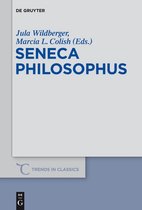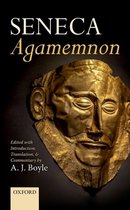Seneca's Affective Cosmos Subjectivité, sentiment et connaissance dans les questions Natural et au-Beyond
Edition: Oxford University Press
Auteur:
Chiara Graf
- en
- Couverture rigide
- 9780198907008
- 20 mai 2024
- 240 pages
Résumé
Chiara Graf examines the role of emotion in the scientific, philosophical, and literary works of Seneca the Younger, reading several of the Roman philosopher's key texts in dialogue with modern studies in affect theory.
What is the role of emotion in the scientific, philosophical, and literary works of Seneca the Younger? Scholarship on Seneca has often historically treated emotion as an obstacle to moral progress in his thought--an inherently treacherous aspect of human experience which must be eradicated via reason. However, a growing body of scholarly work has come to recognize that Seneca made room for emotions in his philosophy, framing such sensations as fear and shame as ethically beneficial in certain circumstances. Seneca's Affective Cosmos: Subjectivity, Feeling, and Knowledge in the Natural Questions and Beyond extends such arguments to arrive at a surprising conclusion: Seneca is prepared to harness towards therapeutic and didactic ends even the extreme and misguided emotions that result from our flawed understanding of the universe. Affect plays a particularly important role for the Senecan proficiens, the morally and intellectually imperfect student of Stoicism. Whereas the idealized figure of the Senecan wise man can achieve ethical progress through reason alone, the proficiens' compromised understanding of the world often prevents him from doing so. When reason fails him, the Senecan proficiens can harness his emotions towards moral progress. For instance, in Seneca's meteorological treatise Natural Questions, stupefaction and anxiety are presented as paradoxical sources of courage in the face of death. Similarly, in the tragedy Trojan Women, grief and hopelessness provide the protagonist Andromache with unexpected solace. Chiara Graf reaches these conclusions by placing a variety of Senecan texts in dialogue with modern works on affect theory, a school of thought that has gained popularity in the Humanities but remains underexplored in the Classics.
What is the role of emotion in the scientific, philosophical, and literary works of Seneca the Younger? Scholarship on Seneca has often historically treated emotion as an obstacle to moral progress in his thought--an inherently treacherous aspect of human experience which must be eradicated via reason. However, a growing body of scholarly work has come to recognize that Seneca made room for emotions in his philosophy, framing such sensations as fear and shame as ethically beneficial in certain circumstances. Seneca's Affective Cosmos: Subjectivity, Feeling, and Knowledge in the Natural Questions and Beyond extends such arguments to arrive at a surprising conclusion: Seneca is prepared to harness towards therapeutic and didactic ends even the extreme and misguided emotions that result from our flawed understanding of the universe. Affect plays a particularly important role for the Senecan proficiens, the morally and intellectually imperfect student of Stoicism. Whereas the idealized figure of the Senecan wise man can achieve ethical progress through reason alone, the proficiens' compromised understanding of the world often prevents him from doing so. When reason fails him, the Senecan proficiens can harness his emotions towards moral progress. For instance, in Seneca's meteorological treatise Natural Questions, stupefaction and anxiety are presented as paradoxical sources of courage in the face of death. Similarly, in the tragedy Trojan Women, grief and hopelessness provide the protagonist Andromache with unexpected solace. Chiara Graf reaches these conclusions by placing a variety of Senecan texts in dialogue with modern works on affect theory, a school of thought that has gained popularity in the Humanities but remains underexplored in the Classics.
Spécifications produit
Nous n'avons trouvé aucune spécification pour votre recherche '{SEARCH}'.
Contenu
- Langue
- en
- Binding
- Couverture rigide
- Date de sortie initiale
- 20 mai 2024
- Nombre de pages
- 240
Personnes impliquées
- Auteur principal
- Chiara Graf
- Editeur principal
- Oxford University Press
Autres spécifications
- Hauteur de l'emballage
- 17 mm
- Hauteur du produit
- 17 mm
- Largeur d'emballage
- 160 mm
- Largeur du produit
- 160 mm
- Livre d‘étude
- Non
- Longueur d'emballage
- 240 mm
- Longueur du produit
- 240 mm
- Poids de l'emballage
- 556 g
EAN
- EAN
- 9780198907008
Choisissez la version souhaitée
Choisissez votre binding
(2)
Informations sur les prix et commande
Le prix de ce produit est de 87 euros et 99 cents.
Pas encore publié - réservez une copie
Disponible le 19-07-2024
Vendu par bol
- Livraison comprise avec bol
- Retrait possible dans un point-relais bol
- 30 jours de réflexion et retour gratuit
- Service client 24h/24
Signaler cet article
Vous souhaitez signaler un contenu illégal à propos cet article:
- Je souhaite faire un signalement en tant que client.
- Je veux faire un signalement en tant qu'autorité ou personne de confiance.
- Je veux faire un signalement en tant que propriétaire de partenaire
- Je veux faire un signalement en tant que propriétaire de marque
Vous n'êtes pas un client, une autorité, personne de confiance, propriétaire de marque ou un partenaire ? Dans ce cas, utilisez le bouton ci-dessous pour effectuer un signalement.






